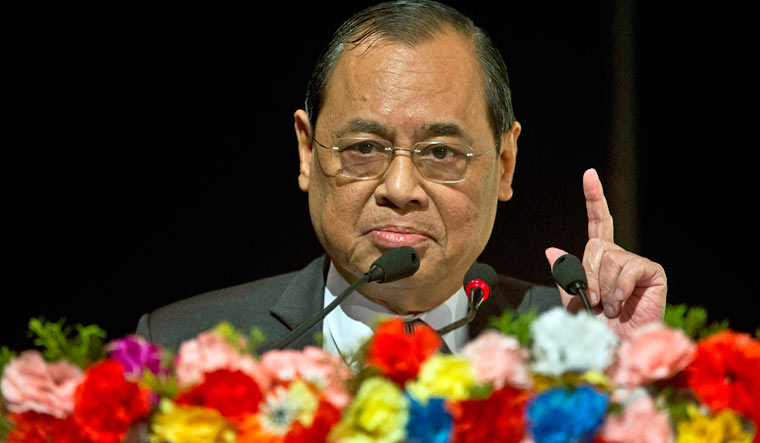The silent departure of the topmost judge of the country, who retires on November 17, is quite in contrast to the ascension to the post, which was preceded by an unprecedented press conference in which he along with three colleagues from the Supreme Court collegium had raised the banner of revolt against the then CJI Dipak Misra.
“Bitter truths must remain in memory,” wrote Chief Justice of India Ranjan Gogoi in his parting note to journalists covering the Supreme Court as he chose silence over speaking about his tenure.
Defending the presser, he had said while delivering the Ramnath Goenka Memorial Lecture that while independent judges and noisy journalists were democracy's first line of defence, in today's context, independent journalists and sometimes noisy judges too are needed.
Gogoi, on his last working day as CJI, spoke of the judiciary's need to “maintain silence while exercising their freedom”. As he signed off, he had a brief, final outing in Court number one, where he spent barely five minutes with the CJI-designate Justice S A Bobde, issuing notices in all ten cases that came up before the bench.
The calm and quiet on his last day in office belies the eventfulness of Gogoi's tenure as CJI, which lasted over 13 months. This was as much for the politically significant judgments passed by him as for issues that lay outside the courtroom.
As CJI, Gogoi passed as many as 47 judgments, with the verdict in the long-pending Ayodhya dispute arguably being the most significant because of socio-political and religious reasons. A five-judge bench headed by Gogoi undertook a marathon 40-day non-stop hearing in the matter before passing a unanimous decision, decreeing the title to Ram Lalla and ordering that five acres of land be provided in Ayodhya to the Muslim side to build a mosque.
Amongst the other important judgments passed by Gogoi is the Sabarimala order, which involved referring the matter, by a majority of 3:2, to a seven-judge bench. Gogoi was also involved in the historic decision to ban the placing of photographs of public functionaries, except for the President, the Prime Minister and the Chief Justice of India, in government advertisements.
The final flourish of judgments before Gogoi demitted office also saw the dismissal of the politically-significant Rafale review petition by a three-judge bench headed by him. The court rejected the plea for registration of an FIR by the CBI for alleged corruption in the purchase of Rafale fighter jets from France. The last few orders also included the historic decision to bring the offices of the Chief Justice of India and the Chief Justices of the high courts under the purview of the Right to Information.
A major administrative decision taken by him was making the apex court's judgments available in seven languages, including Hindi and English.
However, critics feel that Gogoi did not live up to the expectations that people had with him concerning resisting the efforts of the government to undermine the independence of the judiciary, especially since he had participated in the judges' rebellion against CJI Misra over the same issue. While the appointment of judges did pick up during Gogoi's term as CJI, it is felt that in certain instances, the collegium gave in to the government and altered its decision.
Disappointment has also been voiced as regards Gogoi failing to streamline work distribution in the Supreme Court, given that he and three other judges of the apex court had made an open criticism of CJI Misra over his exercise of his powers as the 'master of the roster' and 'selective allocation of cases'.
Gogoi's term saw a major controversy when a junior court assistant wrote a letter to all Supreme Court judges to complain about alleged sexual harassment by Gogoi. While the CJI received a clean chit in the matter by a three-judge panel headed by Justice Bobde, there has been a criticism of the manner in which the apex court dealt with the issue.
“Needless to say, once I am well into retirement, I will look forward to meeting you to talk about things of mutual interest,” he signed off in his note to the media.
It is learnt that Gogoi will settle down in Guwahati following his retirement. While he has chosen silence for the moment, he has indicated that he might speak about his tenure in the future.



